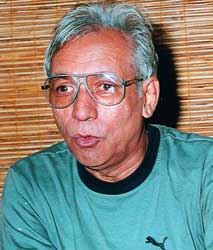
Filmmaker fights for the rights of TV viewersVeteran filmmaker, Vasantha Obeysekera expressed his concern over the blatant violation of internationally accepted norms and practices by Sri Lankan television by showing extremely violent and obscene sequences in their programmes and children becoming the victims of the advertising industry. While detailing about the developing trend in this medium, the experienced filmmaker said that a code of ethics and guidelines has to be implemented immediately to rescue the industry which is used by a majority of the country."Cinema was the most powerful medium but due to many reasons people in our country gave up both cinema and theatre and now television has taken over their place," Mr. Obeysekera stated.
There is hardly 200 films being released in the Sri Lankan cinemas whereas nearly 450 to 500 films are being telecast just for one month, he cited."Most of the Tamil and Hindi films that are screened in television during the day are full of violence and contain sexually indecent scenes" he complained. "And you can't help children being violent and their minds being disturbed after watching them," he claimed. Mr. Obeysekera said that in the state of Kerala, it is banned to telecast Hindi teledramas. This is because they think that those dramas are harmful to the TV audience. But in Sri Lanka we can import any amount of foreign teledramas and telecast, he claimed. According to the regulation of Federal Communication Commission (FCC) in the USA "indecent programming may, however, be restricted in order to avoid its broadcast between 6 am to 10 pm when there is a reasonable risk that children may be in the audience". And such programmes are prohibited to be screened and the Commission is empowered to revoke the licence of the station, impose a monetary forfeiture and other punishments. "With an unending war, the people had been exposed to violence and terror. And with these films and teledramas we cannot help this country becoming a violent nation," the experienced filmmaker argued. Mr. Obeysekera also claimed that the TV advertising industry has a dangerous impact on the future generation of the country. "Advertisement of harmful products targeting children are being aired without any control," he said. Recently the Minister of Health announced that a large number of children under age 12 are suffering from diabetes. But a massive number of advertisements on sweets which are full of preservatives are telecast during children’s programmes. And in America the broadcasters must abide by advertising time limits and restrictions which prohibit "program length commercials" and "host selling" during children's programming in order to protect children, Obeysekera said. Famous children's novelist and former Minister T. B. Ilangaratne introduced Employment of Women, Young Persons and Children Act No 47 of 1956 which stated that children being used for entertainment programmes for money is illegal. "But this is blatantly violated by some of the children’s programmes and even some of the competitions that are being conducted by television channels at present," Obeysekera said. "This has a vicious effect on the children and we have to be extra vigilant about these issues," he said. To control print media there is the Press Council and other regulations. For the cinema there is a Censor Board but for television, the medium that is used by almost every citizen there is nothing. "Anybody can air any rubbish to the television viewers," he stated. He also argued television is not an art form but a medium of commercialised industry. "We cannot consider teledramas as a form of art as it is not a medium that is watched with full concentration like a film. And in television complex structures of the visual art or techniques cannot be exercised," he stated.
And in order to win the attention the programme producers bribe the audience by introducing cheap themes like family breakups, violence on women and many bad social values. Even the televison medium at its inception was a medium of education but now it had become a medium of vulgarism. Mr. Obeysekera who also represented the country at United Nations World Television Forum in 1994 said that Sri Lankan television needs a code of ethics and guidelines to follow. And it is important that a national policy be implemented for the television media. When contacted by TV Times, a Legal Assistant from the National Childcare and Protection Authority (NCPA) said that the children being used in television advertisement is one of the issues under discussion. "When you consider a country like India, the children in the advertisement are used in a way that the positive qualities in their personality is highlighted. But we see some of the advertisements which promotes bad values for children. This can be prevented by a code of ethics or guidelines that should be implemented to television,".
However the law available at present does not prevent children being used in the advertisement, he said. |
|
||||||
|| Front
Page | News | Editorial | Columns | Sports | Plus | Financial
Times | International | Mirror | TV
Times | Funday
Times || |
| |
Reproduction of articles permitted when used without any alterations to contents and a link to the source page.
|
© Copyright
2008 | Wijeya
Newspapers Ltd.Colombo. Sri Lanka. All Rights Reserved. |

